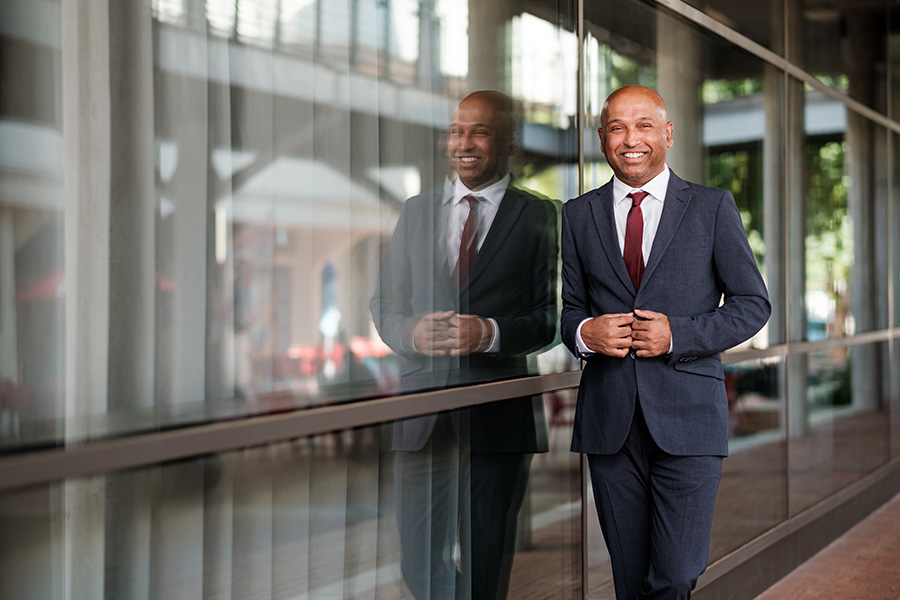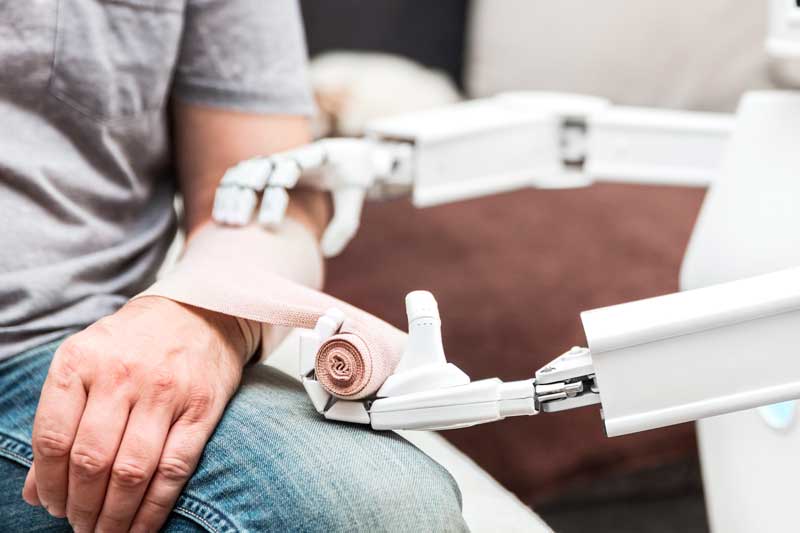Putting data avalanches to work to solve the world’s problems
Engela Duvenage

By the end of this year, the world is expected to have produced 94 zettabytes of data and have 4,95 billion active social media users, all creating more data on a daily basis. Some might feel engulfed by this avalanche of data, but others see it as an ideal opportunity to mine for solutions to the world’s problems, quite literally bit by bit.
The School for Data Science and Computational Thinking, a transdisciplinary research and teaching entity at Stellenbosch University (SU), falls into the latter opportunistic group.
As it states on its website: “Artificial intelligence, robotics, the Internet of Things, autonomous vehicles, 3D printing, precision medicine and quantum computing hold the promise of radically changing all aspects of society. At the core of these advances are the rapidly developing fields of data science and computational thinking.”
As founding director, Prof Kanshukan Rajaratnam is helping lay the strong foundations on which the School is being built.
Years ago, Rajaratnam had the misfortune of having to dig his car out under a metre of unexpected snow on the American East Coast. The snowstorm made the Sri Lankan-born systems engineer seriously rethink his career options in the USA, so much so that he decided to carve himself a niche in his adoptive country of sunny South Africa.
What followed was work in the South African banking and finance sector, in research and in academic administration, all before he was appointed as the director of the School for Data Science and Computational Thinking in 2020.
At its launch in 2019 already, SU rector and vice-chancellor Prof Wim de Villiers described the School as “a game-changer in higher education, both in South Africa and beyond” and as “a vehicle for SU to help enhance South Africa’s competitiveness in the Fourth Industrial Revolution".
Rajaratnam revels in his leadership role, proud of the contribution that distinguished experts associated with the School have already made towards understanding quantum computing, cybersecurity, conflict resolution, conservation and health matters, including the distribution, epidemiology and long-term effects of COVID-19.
Rajaratnam’s systems engineering training helps him maintain a multidisciplinary perspective on the School’s organisational matters, short courses and projects. “We must constantly think how we impact Africa,” he says. “Its problems are big – from governance, food security and energy issues to emerging diseases and the impact of the climate. There are great opportunities for data scientists to help provide solutions by working with people who are domain experts.”
He believes the field of data science will increasingly contribute to personalised and precision medicine, and help develop pharmaceutics tailored to people from specific demographic groups.

Prof Kanshukan Rajaratnam | Photo by Stefan Els

Where humans and data meet
About the SU Rectorate’s vision to build the School into a world-class institution for data science and computational thinking in and for Africa, Rajaratnam boldly notes: “If we can figure out Africa, we can figure out the rest of the world. And that’s an opportunity.”
He sees it as a major benefit that much of the input and investment needed to make this endeavour a success is “highly cerebral” and people-driven, rather than necessarily hardware and infrastructure intensive.
“Data science is in some sense a cheap way of working because computers, cloud infrastructure and fibre links have become much more accessible and pervasive across the continent.”
Rajaratnam foresees many job opportunities opening up for Africa’s bright, entrepreneurial and increasingly tech-savvy youth looking to play a role in their communities and countries. Also, the continent is free of the drawback of legacy infrastructure and can therefore adopt the most suitable technology to solve the blizzards of known and emerging problems.
“Our biggest challenge is to stay relevant yet innovative, also in terms of capacity, and to constantly consider how we impact Africa. One way of doing so is to pivot one’s research from one space to another. This is, for instance, what biomathematicians and epidemiologists did when they moved from studying the HIV pandemic to COVID-19, and now also other emerging diseases.”
Transcending boundaries
The School’s appointment structure reflects its non-typical, transdisciplinary way of doing business. Most staff members hold joint appointments at the School and at an academic faculty such as that of science, engineering, and medicine and health sciences.
In the name of research and training in the data sciences, the School is purposefully moving away from independent research silos. Rajaratnam explains: “Joint appointments involve multiple relationships. We are learning on the job how best to manage them. It starts with a conversation to see what’s possible.”
By late 2022, there are already 11 academics and 10 postdoctoral fellows in the School’s ranks. Among them are the renowned quantum scientist and interim director of the National Institute for Theoretical and Computational Sciences (NITheCS) Prof Francesco Petruccione, the AIMS-Canada Junior Chair in Data Science for Climate Resilience Dr Emmanuel Dufourq, the Capitec Chair in Applied Artificial Intelligence Prof Bruce Watson, and Shane Josias and Dr Sydney Kasongo, co-leaders of the Standard Bank Lab.
A sterling example of the calibre of researchers associated with the School is that of Prof Tulio de Oliveira, director of Africa’s largest genomics centre, the Centre for Epidemiological Research and Innovation (CERI). He holds joint appointments in the School, SU’s Faculty of Science and its Faculty of Medicine and Health Sciences.
De Oliveira, internationally credited for sequencing the Omicron COVID-19 variant, was named one of Nature’s 10 most influential scientists of 2021. In addition, the prestigious Massachusetts Institute of Technology’s MIT Technology Review listed his work towards identifying and tracking COVID-19 variants as one of 2022’s top ten technological breakthroughs.
Rajaratnam views the support De Oliveira has received from the South African government as being grounded “in deep respect for the quality of open science” that De Oliveira and other scientists in South Africa advocate for.
Another joint appointment is that of Prof Brian Ganson of the Stellenbosch Business School’s Centre on Conflict and Collaboration (formerly the ‘Africa Centre for Dispute Settlement’). His team is collaborating with the Copenhagen Business School and the University of Pennsylvania to develop a business and conflict barometer. This tool uses publicly available social media posts, reports and news articles to assess and advise on conflict situations in African countries in real time, ideally before conflict erupts.
“It’s about confronting the myriad ways that the private sector is implicated in the creation and maintenance of conflict, and about finding pathways to address them,” explains Ganson.
Adds Rajaratnam: “All of science is increasingly moving into a multidisciplinary, transdisciplinary space, even more so in the data science and computational thinking world. You’ll never use lab methods from the biological sciences in economics. But data is data. Data science can bring multiple disciplines and groups together by sharing the methods used to handle data and do modelling, and by talking about how each discipline handles issues of privacy and ethics.”
To circumvent the potentially costly affair of creating new data, these issues must be top of mind whenever data is shared between projects.

‘But is it ethical?
Rajaratnam predicts the emergence of novel job types such as data auditors, data ethics specialists and data legislators – all career paths in the tech domain that also involve the humanities. He foresees business project teams having at least one ethics specialist in an oversight role similar to that of a research ethics committee that considers the implications and possible human rights infringements of projects.
“Ethics already quite helpfully allows one to think about whether something is morally right or wrong, even when legislative frameworks are not yet in place. Questions about when personal data can be used for the greater good, for instance, are increasingly important philosophical questions.”
Ethical considerations relating to artificial intelligence and the upskilling of people in digital citizenship were among the first topics tackled in online workshops and short courses presented by the School’s teaching arm, the African Data Science Academy (ADSA). There have also been a number of introductory short courses on data science and the use of R, a particularly powerful software program for data analysis and graphical representation.
“Through ADSA, the School builds capacity in data science not just in South Africa and Africa, but across the world,” says Rajaratnam. He adds that the School also develops and supports bespoke courses for industry and academic partners.
During the course of 2022, Rajaratnam delivered a presentation on equity, ethics and legalities in the digital world as part of an online graduate seminar on digital citizenship, run in collaboration with KU Leuven (Belgium), SU, Waseda University (Japan) and Venice International University (Italy). In November 2022, the programme culminated with a week-long, in-person event in Venice, where Rajaratnam again presented.
In conjunction with Praelexis, the School will also be hosting an in-person machine learning summer school in Gordon’s Bay in January 2023.
Moreover, SU researchers in the School and in the Faculty of Medicine and Health Sciences are currently collaborating on a data science, artificial intelligence and medical ethics project funded by the National Institute of Health.
Rajaratnam is heartened that, in universities across the globe, data science is becoming both a study field in its own right and a focus area within other fields, and that the big data space in countries such as Rwanda and Ghana is expanding. He also feels privileged to have provided input into the plans and business models of big data initiatives at other institutions.
“We build on each other. The question is how we leverage this relationship to build something even better.”